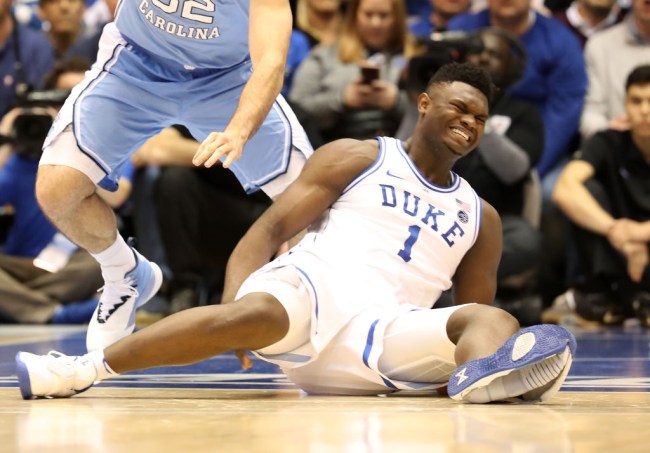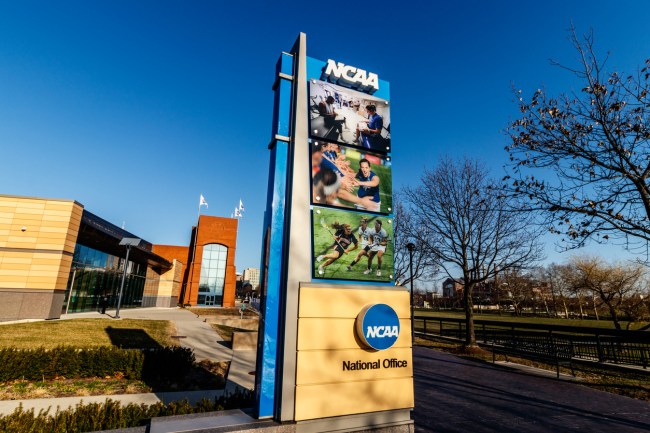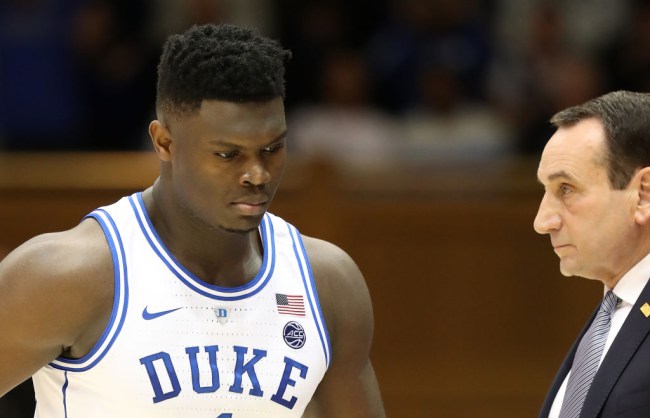
Getty Image
On February 20, 2019, the UNC men’s basketball team marched down Tobacco Road to face Duke in a highly anticipated rivalry matchup.
All eyes were on Zion Williamson, the explosive 6’7″, 285-pound freshman, as he looked to put on a laser show in his own Cameron Indoor Stadium.
Unfortunately, just thirty-six seconds into the contest, the mammoth forward collapsed to the floor with a knee injury after blowing through one of his Nikes.
Zion’s shoe blow out. pic.twitter.com/ObqmE5Zvr8
— Steve Noah (@Steve_OS) February 21, 2019
It became clear early on that this injury was bigger than the Duke-UNC rivalry, Nike’s PR nightmare, and even Zion’s own draft prospects. This was about the rights of NCAA athletes.
Immediately following the incident, Donovan Mitchell of the Utah Jazz went off on the organization.
Again let’s remember all the money that went into this game…. and these players get none of it…. and now Zion gets hurt… something has to change @NCAA
— Donovan Mitchell (@spidadmitchell) February 21, 2019
The next day, the Golden State Warriors’ Demarcus Cousins declared in an interview, “College basketball and the NCAA is bullshit … I think the highest ticket for that UNC-Duke game was $2,500, $3,500. How much does Zion Williamson see? That’s who they’re coming to see, so how much of that is he getting?”
DeMarcus Cousins: “Knowing what I know now, college basketball is bullshit.” Advises Zion Williamson to get ready for the NBA. pic.twitter.com/k3B1JA0E42
— Anthony Slater (@anthonyVslater) February 21, 2019
Individual players like Zion generate hundreds of thousands of dollars in revenue for their schools through ticket sales, merchandise, publicity, advertising, and television licensing deals. However, they don’t see a dime of it. A couple of months ago, an NFL exec went as far as calling the NCAA “crooks,” saying “it’s garbage” that they’re still profiting off of student-athletes.
Some might shout back that most of these kids are on full scholarship and receive free shoes and clothes. However, that doesn’t even scratch the surface of what a superstar NCAA athlete rakes in for their school. According to a 2012 study, the annual fair market value for the average FBS football player at the time was $137,357 (it was $289,031 for the average power-conference men’s basketball player). A reasonable system would see athletes paid closer to their worth.
Compensating NCAA athletes is the fair and just solution. After all, this isn’t some shadowy communist autocracy where workers are paid at the whim of some detached, unaccountable organization. This is America: work hard, get paid.
In addition to being the right thing to do, paying athletes would encourage them to stay in college longer. If players could earn a wage, they would be able to support themselves and their family while attending school. This would diminish much of the financial pressure to sign with a professional team., and with the newfound financial bandwidth, many of these athletes would complete their degree programs.
Whether or not they think they will need it, a college degree is extremely valuable. The average NFL career is just 3.3 years, and for the NBA, it is 4.5 years. For the average athlete, this leaves more than a few decades of expenses unaccounted for. As a result, a college degree would undoubtedly be helpful.

iStockphoto
Additionally, the legalization of sports gambling basically necessitates that colleges begin paying student-athletes. As I mentioned, unpaid athletes generate millions for networks, their school, and sports bettors, yet they reap none of the benefits.
Unlike professional athletes who make comfortable enough salaries to avoid the temptation of fixing games, a disgruntled college player may be inclined to miss a layup in garbage time to make a couple thousand dollars. Gambling is only going to get bigger in the coming years and the NCAA must get ahead of it before it runs into another major scandal.
Opponents of paying NCAA athletes might argue that eighteen-year-old kids aren’t responsible enough to handle that kind of money. Colin Cowherd previously said:
“I don’t think paying all college athletes is great … Listen, 90 percent of these college guys are gonna spend it on tats, weed, kicks, Xboxes, beer and swag … They’re not gonna budget it efficiently, they’re not going to invest it.”
Yeah, maybe, Colin. But isn’t it their right to spend their pay how they see fit? If I work 40 hours this week and decide to blow my paycheck gambling on no-holds-barred Jello wrestling matches in a repurposed barn off I-95, that’s my constitutional right.
The same basic opportunity should be afforded to college athletes. They are creating value for their institutions and must be compensated for it. What they do with that money is not the concern of their employer.
Others might argue that paying student-athletes would strip all passion from the game, saying players will become motivated solely by money (as if that’s the end of the world). They claim their hunger will be traded for half-assed efforts sometimes seen in the pros. This might be the craziest argument I’ve seen.
By paying young athletes to do what they love and showing them they can make a living doing it, you’re removing passion from the game? If anything, this would motivate athletes to work harder as their pay is tethered to performance.
One reasonable point NCAA Stalinists have made is that paying athletes would change the relationship between colleges and their players. Paying students would replace the revered teacher-student relationship with an employer-employee dynamic. But what if there was a way to pay players without costing their schools a dime?
Nancy Skinner, a California state senator, recently proposed Senate Bill 206, also known as the “Fair Pay to Play Act.” The bill would allow athletes to receive compensation for their hard work through corporate sponsorship deals. Zion Williamson, for example, could sign a lucrative shoe deal with Nike while in college.

Getty Image
This bill costs nothing to the schools, taxpayers, or regulators. Skinner is merely asking that the NCAA take its knee off the athletes’ necks.
In recent years, the NCAA canceled multiple fundraisers for a severely injured football player, suspended baseball players for participating in a fantasy football league, banned an athlete for using CBD to treat his seizures, and sidelined a player for moving closer to his very sick mother.
It’s about time we put out this regulatory dumpster fire. This charade of an organization provides little value while depleting it wherever possible. Not only should athletes be paid, but I’m beginning to think we should abolish the NCAA.
Let’s start the movement.
#AbolishTheNCAA.